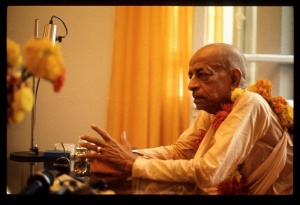CC Madhya 3.168 (1975): Difference between revisions
(Vanibot #0027: CCMirror - Mirror CC's 1996 edition to form a basis for 1975) |
(Vanibot #0020: VersionCompareLinker - added a link to the Version Compare feature) |
||
| Line 2: | Line 2: | ||
<div style="float:left">'''[[Sri Caitanya-caritamrta (1975)|Śrī Caitanya-caritāmṛta (1975)]] - [[CC Madhya (1975)|Madhya-līlā]] - [[CC Madhya 3 (1975)|Chapter 3: Lord Śrī Caitanya Mahāprabhu's Stay at the House of Advaita Acārya]]'''</div> | <div style="float:left">'''[[Sri Caitanya-caritamrta (1975)|Śrī Caitanya-caritāmṛta (1975)]] - [[CC Madhya (1975)|Madhya-līlā]] - [[CC Madhya 3 (1975)|Chapter 3: Lord Śrī Caitanya Mahāprabhu's Stay at the House of Advaita Acārya]]'''</div> | ||
<div style="float:right">[[File:Go-previous.png|link=CC Madhya 3.167 (1975)|Madhya-līlā 3.167]] '''[[CC Madhya 3.167 (1975)|Madhya-līlā 3.167]] - [[CC Madhya 3.169 (1975)|Madhya-līlā 3.169]]''' [[File:Go-next.png|link=CC Madhya 3.169 (1975)|Madhya-līlā 3.169]]</div> | <div style="float:right">[[File:Go-previous.png|link=CC Madhya 3.167 (1975)|Madhya-līlā 3.167]] '''[[CC Madhya 3.167 (1975)|Madhya-līlā 3.167]] - [[CC Madhya 3.169 (1975)|Madhya-līlā 3.169]]''' [[File:Go-next.png|link=CC Madhya 3.169 (1975)|Madhya-līlā 3.169]]</div> | ||
{{CompareVersions|CC|Madhya 3.168|CC 1975|CC 1996}} | |||
{{RandomImage}} | {{RandomImage}} | ||
==== TEXT 168 ==== | ==== TEXT 168 ==== | ||
| Line 32: | Line 31: | ||
<div class="purport"> | <div class="purport"> | ||
It is the duty of all gṛhasthas to invite a sannyāsī to their homes if he happens to be in the neighborhood or village. This very system is still current in India. If a sannyāsī is in the neighborhood of a village, he is | It is the duty of all gṛhasthas to invite a sannyāsī to their homes if he happens to be in the neighborhood or village. This very system is still current in India. If a sannyāsī is in the neighborhood of a village, he is inv ted by all householders, one after another. As long as a sannyāsī remains in the village, he enlightens the inhabitants in spiritual understanding. In other words, a sannyāsī has no housing or food problems even when he travels extensively. Even though Advaita Ācārya was supplying Caitanya Mahāprabhu with prasāda, the other devotees from Navadvīpa and Śāntipura also desired to offer Him prasāda. | ||
</div> | </div> | ||
Latest revision as of 17:00, 27 January 2020

A.C. Bhaktivedanta Swami Prabhupada
TEXT 168
- śrīvāsādi yata prabhura vipra bhakta-gaṇa
- prabhuke bhikṣā dite haila sabākāra mana
SYNONYMS
śrīvāsa-ādi—the devotees, headed by Śrīvāsa Ṭhākura; yata—all; prabhura—of the Lord; vipra—especially the brāhmaṇas; bhakta-gaṇa—devotees; prabhuke—unto the Lord; bhikṣā—lunch; dite—to give; haila—there was; sabākāra—of all of them; mana—the mind.
TRANSLATION
Since Advaita Ācārya was giving alms and food to Lord Caitanya Mahāprabhu, the other devotees, headed by Śrīvāsa Ṭhākura, also desired to give Him alms and invite Him for lunch.
PURPORT
It is the duty of all gṛhasthas to invite a sannyāsī to their homes if he happens to be in the neighborhood or village. This very system is still current in India. If a sannyāsī is in the neighborhood of a village, he is inv ted by all householders, one after another. As long as a sannyāsī remains in the village, he enlightens the inhabitants in spiritual understanding. In other words, a sannyāsī has no housing or food problems even when he travels extensively. Even though Advaita Ācārya was supplying Caitanya Mahāprabhu with prasāda, the other devotees from Navadvīpa and Śāntipura also desired to offer Him prasāda.